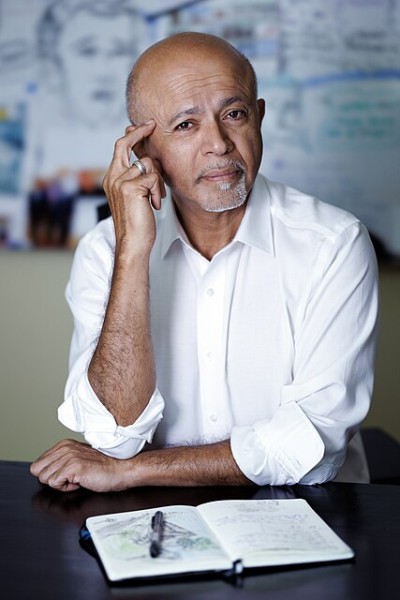
Abraham Verghese (born 1955) is an American physician and author. He is the Linda R. Meier and Joan F. Lane Provostial Professor of Medicine, Vice Chair for the Theory & Practice of Medicine, and Internal Medicine Clerkship Director at Stanford University Medical School. In addition, he is the author of four best-selling books: two memoirs and two novels. He is the co-host with Eric Topol of the Medscape podcast Medicine and the Machine.
In 2011, Verghese was elected a member of the Institute of Medicine. In 2014, he received the 19th Annual Heinz Award in the Arts and Humanities. President Barack Obama presented him with the National Humanities Medal in 2015. In 2023, he was awarded a Guggenheim Fellowship. He has received six honorary doctorate degrees.
Verghese was born in Ethiopia to Orthodox Christian parents from Kerala, India, who worked as teachers. As a child, he was an avid reader, and it was reading that introduced him to the world of medicine. He has three children, two sons by his first marriage and a third by his second marriage. His elder brother, George Verghese, is an engineering professor at MIT and his younger brother, Phil Verghese, is a former software engineer at Google.
Medical training and career
Verghese began his medical training in Ethiopia. In 1974, his education was interrupted by the civil unrest when emperor Haile Selassie was deposed and a Marxist military government took over. He left the country and joined his parents, who had emigrated to America. There, Verghese worked as a hospital orderly for a year. In his written work, he refers to that experience as deeply influential in confirming his desire to finish his medical training.
He went to India to complete his medical studies at Madras Medical College and was awarded a Bachelor of Medicine degree from Madras University in 1979, finishing an internship there.
Returning to the United States as a foreign medical graduate seeking an open residency position, he joined a new program in Johnson City, Tennessee, affiliated with East Tennessee State University.
After completing his residency in 1983, he took a fellowship at Boston University School of Medicine. He worked for two years at Boston City Hospital, where he encountered the early signs of the urban HIV epidemic. Returning to Johnson City in 1985 as assistant professor of medicine, he saw the first signs of a second epidemic, that of rural AIDS. Expecting to have one or two HIV patients a year, he soon had 100 in a small town. Although at the time he had no ambition to become a writer, he decided he wanted to tell the story of this tragedy, so he took a break from medicine to study writing.
In 1991 Verghese accepted a position as Professor of Medicine and Chief of the Division of Infectious Diseases at Texas Tech Health Sciences Center in El Paso, Texas Despite his title, he was the sole infectious disease physician at Thomason Hospital. He was awarded the Grover E. Murray Distinguished Professorship of Medicine at the Texas Tech School of Medicine.
Eleven years later, Verghese became founding Director of The Center for Medical Humanities and Ethics at the University of Texas Health Science Center at San Antonio. At San Antonio, he held the Joaquin Cigarroa Chair and the Marvin Forland Distinguished Professorship.
After five years in San Antonio, he joined Stanford University School of Medicine in 2007 as a tenured professor for the Theory and Practice of Medicine and Associate Chair of Internal Medicine. He is a hospitalist for Stanford Medical Center and is the founder and director of the Presence program, which "champions the human experience in medicine."